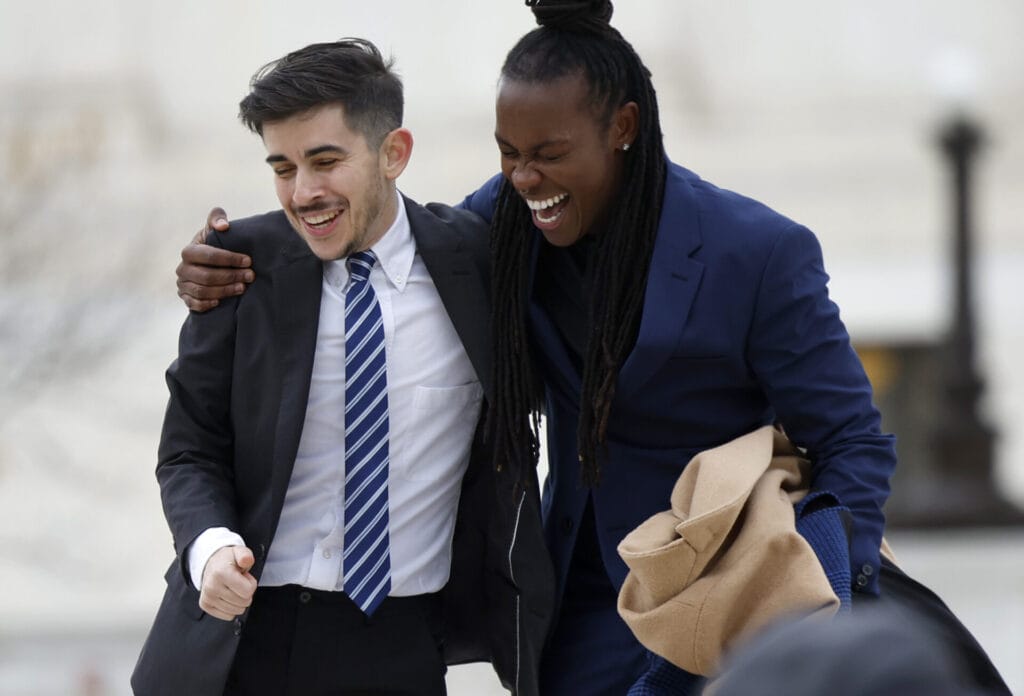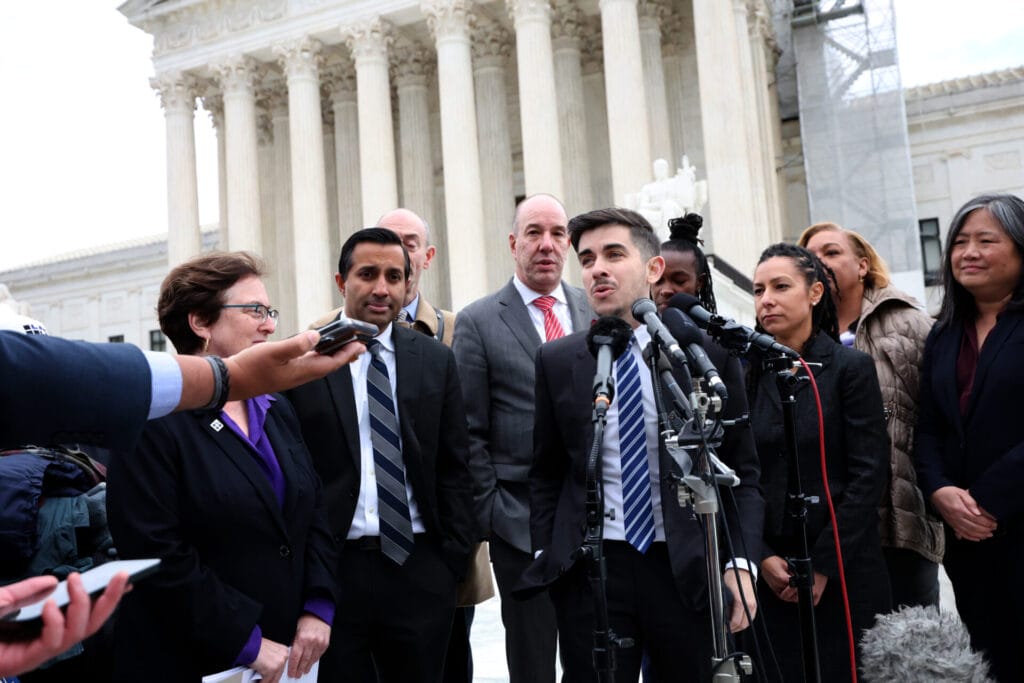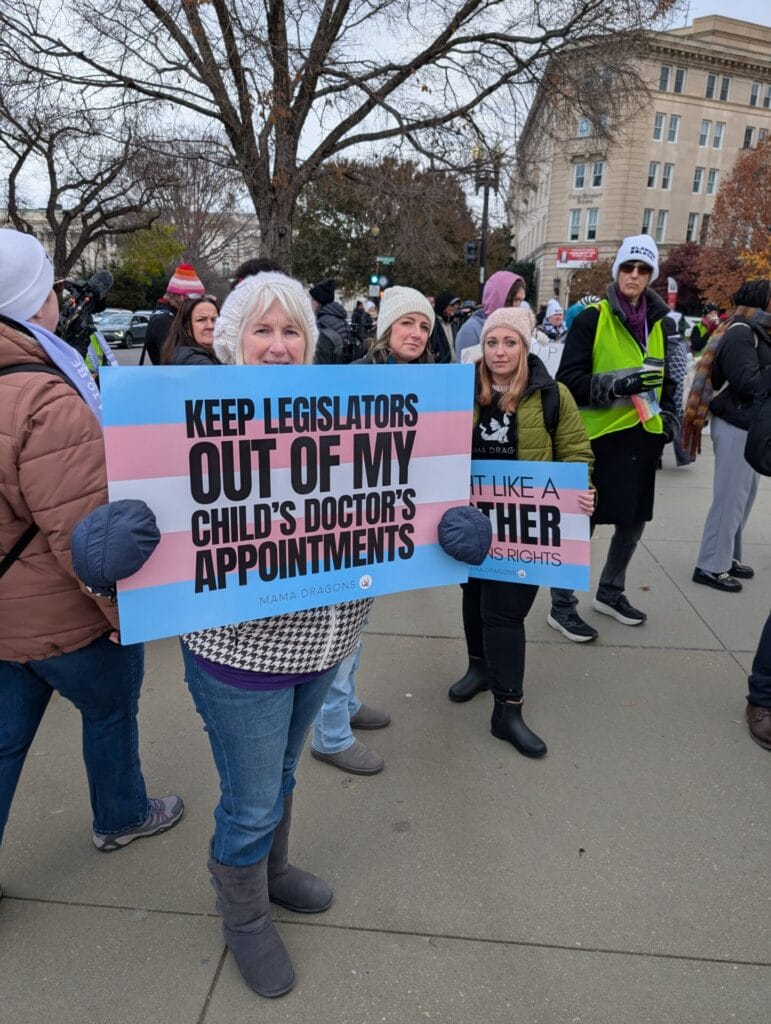The U.S. Supreme Court heard oral arguments yesterday in U.S. v. Skrmetti, a landmark case that could have widespread impacts on the availability of health care for transgender youth and their families nationwide, as well as the freedom of health providers to offer care.
The case challenges Tennessee’s law banning health care such as hormone therapy and puberty-pausing medications for transgender youth under 18, while the same treatments remain available to cisgender (non-transgender) youth. The law also criminalizes doctors and providers who seek to support transgender youth seeking care. The ban is one of approximately 25 such bans passed in Republican-controlled legislatures around the country in recent years, despite every major medical association and leading health authority in support of health care for transgender people:and youth.The Court’s decision could have widespread impact on the availability of care to all youth nationwide.
“U.S. v. Skrmetti is a groundbreaking moment of visibility for transgender Americans and will have a tremendous impact on whether we continue treating one another with dignity and respect in this country,” said GLAAD’s President and CEO Sarah Kate Ellis (she/her). “Sweeping categorical exclusions on mainstream consensus health care for any group of Americans are discriminatory, as many federal courts have already affirmed, including in red states. It is imperative that those watching understand the stakes here – access to health care should be available to all who need it, without the interference of the government. Private and deeply personal health care decisions should remain between families and their trusted health care providers — not left to the whim of politicians, the U.S. Supreme Court, or anyone else. It is urgent that the Court see all citizens as worthy of life and liberty, values all Americans support.”
The hearing began with arguments on the side of the plaintiffs, presented by U.S. Solicitor General Elizabeth Prelogar and American Civil Liberties Union staff attorney Chase Strangio – the first time that an out transgender attorney argued before the U.S. Supreme Court.

The arguments focused on how the legislation overrides decision making by parents, patients, and providers grappling with how to support transgender youth.
“What is really going on here is discrimination against and disregard for young people who are trans,” observed Justice Kagan early in the hearing. “We do think this law discriminates on transgender status and should require heightened scrutiny,” Prelogar agreed – meaning that the law is likely to be illegal under the U.S. Constitution’s ban on discrimination based on sex; and so the government must apply a stricter standard of review and fulfill a burden of proving that banning transgender youth and families from accessing medications (while allowing cisgender youth to continue using them) advances an important governmental interest. The 6th Circuit Court of Appeals failed to apply that higher standard in its consideration of the law, Prelogar and Strangio argued. This “heightened scrutiny” requirement helps the government take into account that certain marginalized communities have a strong history of facing discrimination in this country.
The attorney arguing in support of Tennessee’s ban, J. Matthew Rice, spent most of his time attempting to deflect questions from Justice Ketanji Brown Jackson about why he believes the law isn’t a question of sex discrimination.
“Our fundamental point is there is no sex-based line,” Rice claimed, asserting that the distinction is only in the treatments. Justice Jackson offered a few hypotheticals – if a cisgender (non-transgender) boy seeks medication to deepen his voice, and a transgender boy seeks medication for the same reason, aren’t they seeking the same medical treatment for the same purpose and the only difference is their sex assigned at birth? By changing the boy’s birth sex, the restriction held by Tennessee’s law lifts.
Strangio affirmed in his remarks that sex should not be the basis for the denial of health care that providers recommend and a young person’s parents consent to. “Every medical treatment has a risk,” Justice Sotomayor pointed out, including common treatments like taking aspirin.
The lawyer supporting Tennessee’s ban went on to suggest such policies are best left to the democratic process. Justice Jackson again countered that it’s hard to see how the democratic process will protect you “when you’re 1% of the population or less,” as transgender people are – considering it historically has not worked to protect Black people or women in the U.S.
Both sides agreed that protecting the health of adolescents is in the government’s interest, but opponents of transgender health care pointed only to a handful of outdated studies to argue that the risks of transgender health care outweigh the benefits. Strangio shared that the most relevant studies show overwhelmingly that once a transgender adolescent reaches the onset of puberty, the likelihood of relating to their birth gender is extremely low; and regret rates are “as low as 1%.” Prelogar additionally pointed out that puberty blockers, for example, have no impact or potential side effects on fertility; and with respect to hormone therapy, there are additional fertility-protective measures people can take to reduce any risk of unwanted side effects.

Those tradeoffs regarding risk and benefit are not unique to transgender health care, but a part of all medical decision making and informed consent. There is always the small chance that someone will regret medical care they receive, but the most recent evidence demonstrates this is a very small number among transgender people; and a categorical ban is not a well-tailored method of addressing that concern. In contrast, the impact of denying care or postponing care for transgender youth until they are adults can significantly worsen their experience of gender dysphoria, force irreversible onset of unwanted secondary sex characteristics that make transgender people more susceptible to discrimination and harassment as adults, and increase the risk of depression and suicidal ideation.
Preloger and Strangio offered the example of West Virginia as a state that took a different, more nuanced approach due to their Senate Majority Leader’s knowledge and experience as a doctor. Rather than passing an outright ban on health care for transgender youth, state legislators set guardrails to create a reliable pathway allowing access to care under individual circumstances, such as multiple diagnoses from more than one doctor, a classification of severe gender dysphoria, consultation with counselors, consent from parents, and ruling out other diagnoses. That law is “tailored to the precise interests” of individuals, rather than the sweeping interest of Tennessee’s law to “encourage minors to appreciate their sex,” as is written in the statute. (There has been no litigation challenging West Virginia’s law.)
In the final rebuttal, U.S. solicitor general Prelogar concluded arguments by pointing to the example of Ryan, one of the plaintiffs in the case. Ryan’s symptoms of gender dysphoria were so severe that he considered going mute because his voice caused him such distress. He was throwing up at school every day and unable to focus on his education. Since being able to access care, his parents say he has thrived. Tennessee’s law harms real families by making it impossible for transgender youth like Ryan to access medically necessary and sometimes lifesaving care, even in the most severe circumstances.
After the hearing and outside the Court, Strangio spoke of the history made inside. “Today, we were able to stand before this court and say the Constitution protects trans people just like it protects everyone else,” Strangio said.
View this post on Instagram
Other leaders similarly expressed joy and gratitude for the history made today, including Representative Leigh Finke of the Minnesota House of Representatives, one of the only out transgender elected lawmakers in the country. “I hope that people will understand that gender-affirming care is health care. Health care decisions belong in the home, in the doctors’ office – not in the courts and not with politicians. We do not do this for other forms of health care. We are doing it because trans people are trans; and that should be illegal; and I hope the Court will find it so.”
View this post on Instagram
Sarah Kate Ellis also appeared on CNN to react to the oral arguments and provide greater national context. “This isn’t about health care. This isn’t about trans people. This is about politicians politicizing the LGBTQ community for their own gains; and I think what this does is pull us back and actually hurt trans youth, because they need this health care – it’s medically important. … Trans kids have been around forever, but now they’re being politicized; and this is going to have damaging effects for them over the next decades.”
“This is about politicians politicizing the LGBTQ community for their own gains. What this does is pull us back and actually hurt trans youth because they need this health care. It’s medically important.” @sarahkateellis.bsky.social on @cnn.com this morning⬇️
GLAAD recently hosted a media briefing alongside the American Civil Liberties Union, the GenderCool Project, and the Fenway Institute highlighting experts and voices of those impacted by the case. GLAAD also issued a fact sheet last month about what’s at stake in the case.
Those who missed yesterday’s hearing can hear the full audio here and read the transcript here. GLAAD’s most up-to-date recommendations for reporters covering the U.S. v. Skrmetti oral argument can be found here. A ruling in the case is expected in June 2025.













